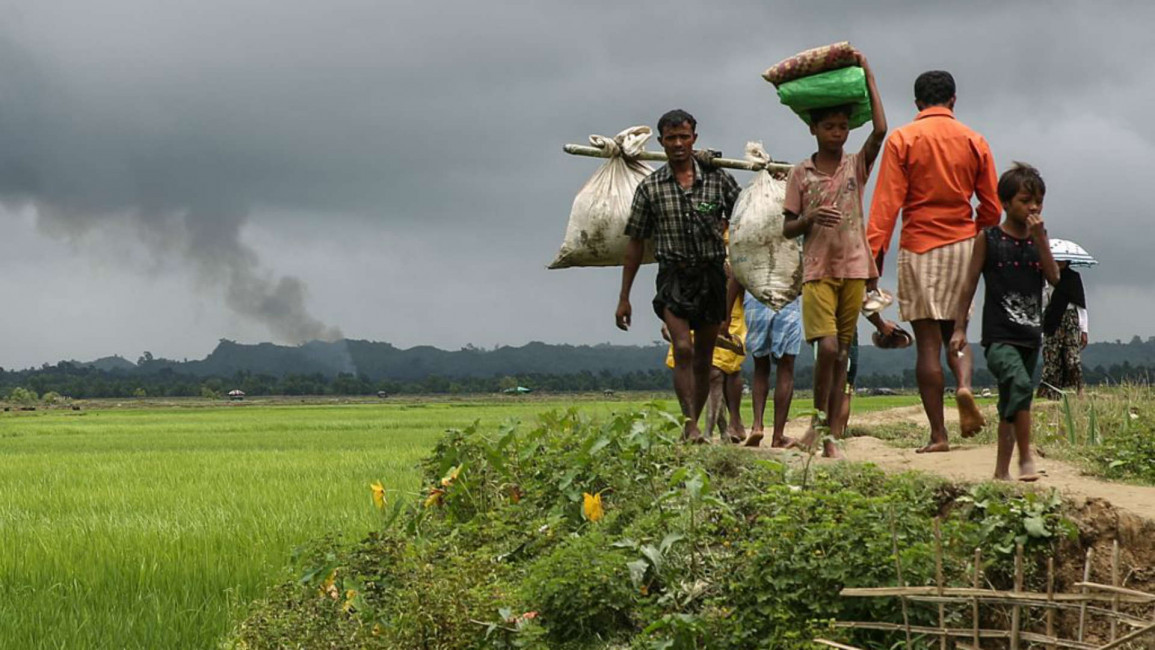
The Rohingya: Southeast Asia's Palestinians
The reports are horrific: Untold thousands have been killed, entire families burned alive, villages set on fire, children as young as five beheaded, women raped and the borderlands are booby-trapped with landmines, as members of "one of the most persecuted communities in the world" try to escape to safer ground in Bangladesh.
Denunciations are pouring in too - much too late, as is always the case in genocides. A damning new study by Queen Mary University of London concludes that after decades of oppression, the Rohingya have reached "the final stages of genocide".
Yet one important aspect of the government's attacks on this population remains mostly hushed up, with the exception of a few courageous voices: The weapons used by the Burmese military for this ethnic cleansing have been field tested in another set of racist assaults, namely Israel's cyclical wars on the Palestinian people; mostly civilian refugees trapped in Gaza, but also in the West Bank.
The alliance between Israel and Myanmar should come as no surprise. Even though Jews had historically experienced anti-Semitism in Europe, not Palestine, the Palestinian people was made to pay the price for the pogroms and Holocaust.
 |
Today, as it emerges from decades of colonialism followed by military rule, Myanmar also shows signs of nationalism gone awry |  |
Israel's insistence that it be recognised as "the Jewish state," even though, or more correctly because it is built on the ruins of what used to be a thriving multi-religious land, stems from its desire to legitimise ethnic cleansing.
Today, as it emerges from decades of colonialism followed by military rule, Myanmar also shows signs of nationalism gone awry, as it seeks to establish a religiously homogeneous Buddhist state by displacing its predominantly-Muslim Rohingya population.
The many parallels between Israel's treatment of the Palestinian people, and Myanmar's treatment of its Rohingya communities, are also worth exploring.
Twitter Post
|
Palestinian-American journalist Ramzi Baroud has already pointed out that, for anyone familiar with the circumstances of the Palestinian people, the similarities are obvious.
Indeed, the latest escalation by Myanmar against the Rohingya follows a pattern most familiar in Israel: Myanmar's attacks, launched on 26 August, are described as a "response" to attacks by Rohingya militants on 25 August.
That the latest escalation by the Burmese military should be presented as "response," with no reference to the context of extreme decades-long repression, is uncomfortably reminiscent of Israel's murderous assaults on an entire population, in response to rocket attacks from the Gaza Strip that, in most cases, fizzle harmlessly across an illegal border.
Indeed, Israel is notorious for its disproportionate collective punishment of entire families, generally in "response" to an angry teenager's lashing out at the egregious injustice they are subjected to. And the genocidal blockade on the Gaza Strip is Israel's response to the outcome of democratic elections which were not to its liking.
Israel was founded on the genocide of the Palestinian people. While common knowledge to anyone who cares about justice, that reality has historically been hushed up and denied too, because accusing a country of genocide necessitates multinational intervention and sanctions, which the United Nations clearly is unwilling to implement.
This is despite the fact that the UN's own definition of genocide would incriminate Israel. Additionally, Israel has maintained its Jewish supremacy against the "demographic threat" posed by the Palestinian people through a violent military occupation, punctuated by episodes of all-out wars against the Gaza Strip. It describes these episodes as "mowing the lawn", a sanitised expression that erases the indiscriminate violence against the two million mostly-civilian refugees trapped in one of the most densely populated areas in the world.
Myanmar stripped the Rohingya of their citizenship in 1982, and has since engaged in episodic attacks against this community, repeatedly forcing them to flee into neighboring countries, with harrowing stories of murder, rape and torched villages. Myanmar's official position is that the Rohingya are originally from Bangladesh, and it refers to them as "Bengalis," just as Israel would have the Palestinians be "southern Syrians," (as Golda Meir put it) or “Jordanian,” and refers to them as “Arab,” rather than Palestinian.
Twitter Post
|
Israel has a two-tier system of citizenship, whereby only Jews are "nationals," while non-Jews can be "citizens," with a different and unequal set of rights.
Moreover, even as it violates the universally recognised human "right of return," which would allow Palestinians displaced in 1948 to return to their homeland, Israel has a "Law of Return" that allows anyone with a Jewish grandparent to claim nationality in Israel.
Myanmar has a multi-tiered citizenship system which also legitimates institutional racism. The 1982 Burmese Citizenship Law has three levels of citizenship, namely "citizenship," "associate citizenship," and "naturalised citizenship".
| Read more: Call it what you wish, it amounts to Apartheid | |
"Citizens," the most privileged category, are members of what are considered "national races," or people whose ancestors can document a presence in the country prior to 1823, the beginning of the British occupation of the region.
"Associate citizens" are those who cannot produce evidence of ancestral presence in Burma before 1823, but who had applied for citizenship prior to independence in 1948. "Naturalized citizens" must be able to provide "conclusive evidence" that they, or their parents, lived in the country prior to 1948.
Additionally, to qualify for any category of citizenship, one must be of "good character" and "sound mind," and fluent in one of the "national languages," (which do not include Rohingya).
With these arcane and highly subjective criteria, the Rohingya are disqualified from citizenship. Finally, and in violation of international law which states that an infant born in a country should receive that country's nationality if it is otherwise stateless, Rohingya babies do not qualify for Myanmar citizenship.
Denunciations of one genocide but not another sound hollow at best, self-serving at worst. If one recognises "the precursors of genocide," one should denounce these everywhere.
 |
Myanmar's official position is that the Rohingya are originally from Bangladesh, and it refers to them as 'Bengalis,' just as Israel would have the Palestinians be 'southern Syrians,' |  |
Cameron Hudson, director of the Holocaust Museum's Simon-Skjodt Center for the Prevention of Genocide, says, "government efforts to deny Rohingya citizenship rights, restrict their freedom of movement and the practice of their faith, and deny their basic human rights have all been identified as leading precursors to a genocide".
With this in mind, we should also denounce these same measures elsewhere: Israel denies Palestinians their basic human rights, it restricts their freedom of movement with hundreds of checkpoints and a 12-year siege, it prevents them from practicing their faith by denying them access to al-Aqsa mosque, and by banning the Muslim call to prayer.
The Rohingya and the Palestinian people have much in common, as both have been persecuted, repeatedly displaced, denied citizenship, and are now subjected to genocide, for the sake of maintaining the ethnic supremacy of one ruling group.
Hopefully, the outrage over the latest attacks on the Rohingya will not subside as soon as a ceasefire is announced, as the oppression is systemic, institutionalised, relentless, just as Israel's violation of the human rights of the Palestinians is a permanent feature of "the Jewish state".
But Israel's crimes go beyond its own borders, and if turning a blind eye to genocide makes the rest of the world complicit, what does supplying the guilty party with the weapons of genocide make Israel?
Nada Elia is a Diaspora Palestinian scholar, writer, public speaker and BDS organiser.
Follow her on Twitter: @nadaelia48
Opinions expressed in this article remain those of the author and do not necessarily represent those of The New Arab, its editorial board or staff.





